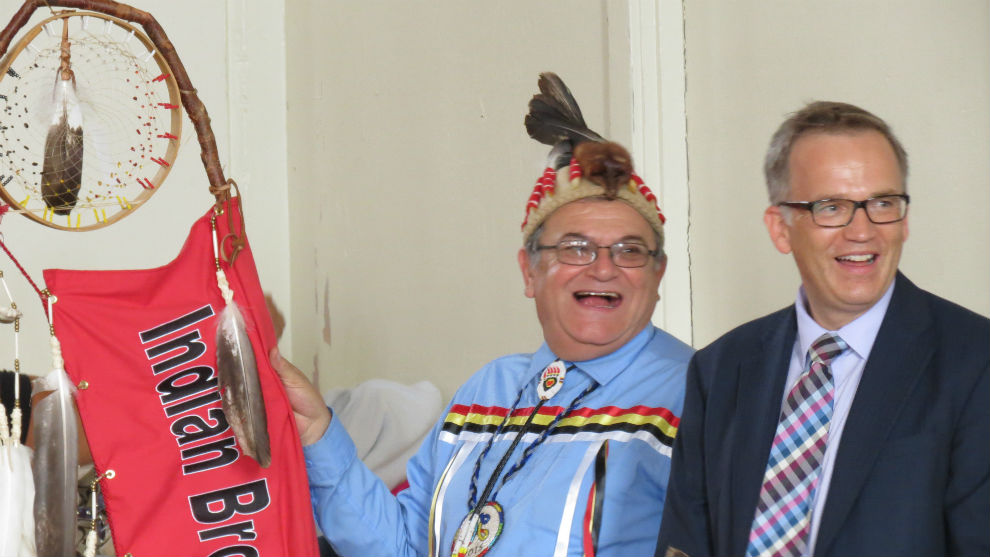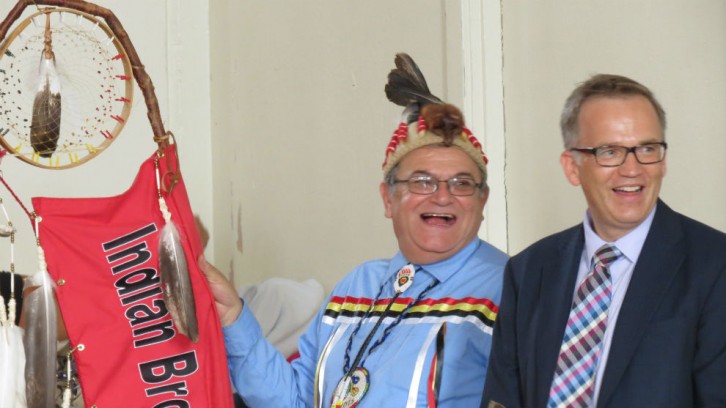Indigenous Studies
New Dal minor program is highlight of Mi’kmaq celebration
Sixth annual gathering reflects culture's resurgence

caption

caption
Chief Rufus Copage and Dalhousie president Richard Florizone at the annual Mawio’miThis year’s Mawio’mi at Dalhousie University wasn’t just a flurry of colour and thunderstorm of drumbeats – it also marked a step forward for indigenous education.
Before the Mawio’mi – also known as a powwow – began, Dalhousie president Richard Florizone highlighted the university’s new minor in Indigenous Studies for this upcoming school year.
“We need to focus on helping our students understand more about Aboriginal history and ways of knowing,” he said. “So this year is a big achievement.” Related stories
The program has been in the works since late 2013. Students will be required to take six credit hours of historical and contemporary issues in indigenous studies, with elective options ranging from “The Art and Science of Drumming” to “Philosophy of Race.”
“It’s about damn time,” laughed Savvy Simon, a craftsperson at the powwow. “I’m actually really surprised that it hasn’t existed before.”
“Well, it’s a start, isn’t it?” said Doreen Bernard, a residential school system survivor and keynote speaker at the Mawio’mi. “It’s like decolonizing what people have already learned about our people and relearning that.”
Florizone said the minor option is doing favourably; he was pleased to note that students registered in the minor came from 14 programs across five faculties.
“Aboriginal culture is important to all of us because it is Canadian culture,” he said. “Treaties aren’t just about First Nations; they’re about all of us Canadians, and it’s important that we understand that part of our history.”
The celebration
This year’s Mawio’mi was celebrated on the eve of Treaty Day – remembering Oct. 1, 1752, when the Mi’kmaq signed a peace treaty with the British Crown.
“It’s also a time to honour our ancestors for everything they have done before us, to bring us to where we are,” Bernard said. “We still rely on our ancestors for strength and for guidance and for protection.”
The main event filled Dalhousie’s Studley Gym with Mi’kmaq dancers, drummers and crafters, and an audience of curious students and parents. It was heart-warming for Bernard, who remembers when, two decades ago, only a few people showed up to their annual gathering.
“We didn’t have this,” she said. “To see how much it’s grown and our language and our teaching…our culture is coming back.”
As a keynote speaker, Bernard recited Mi’kmaq prayers before the festivities began. She also participated in some of the traditional dances, which circled the middle of the gymnasium and included Mi’kmaq dancers but also non-Native members of the crowd.
Simon sold T-shirts with homemade slogans. While most of the shirts were witty and playful, one paid sombre tribute to residential school survivors, with the slogan, “Honouring our residential school survivors and remembering those we lost.”
Simon said her grandmother, who is a survivor, inspired her T-shirt business.
“Being raised in that type of home and experiencing the generational effects from her, I’ve learned first-hand what they’ve been through,” she said. “I have so much deep respect for their [other survivors’] resilience, for their determination, to keep our culture alive.”
And celebrating the Mawio’mi certainly helps.
“It’s nice for us to be able to celebrate…because back in the day, our grandparents could not do that,” said Simon. “We’ve come a long way as a nation.”
[idealimageslider id=”926″]

